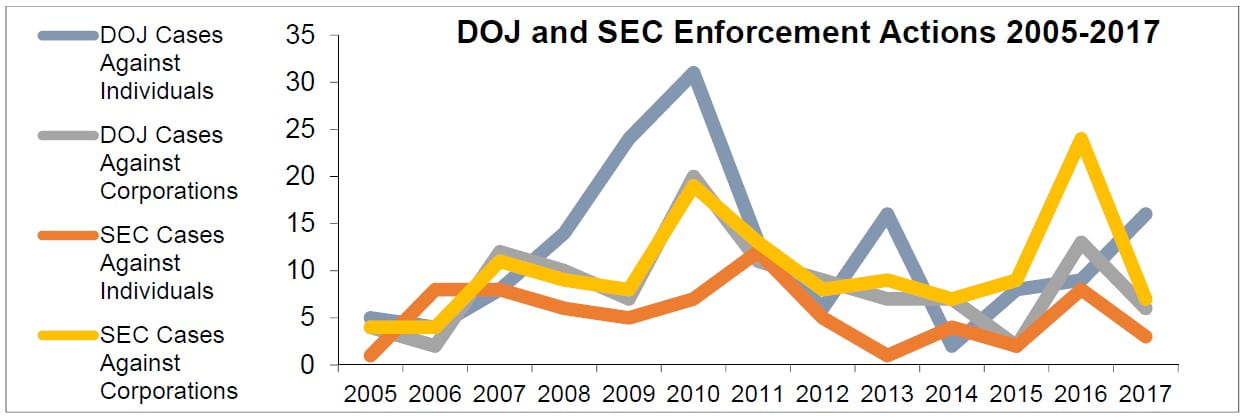by Kimberly A. Parker, Jay Holtmeier, Erin G.H. Sloane, Lillian Howard Potter, Tetyana V. Gaponenko, Victoria J. Lee, and Roger M. Witten
This past year marked the 40th anniversary of the U.S. Foreign Corrupt Practices Act (“FCPA”). Since its enactment in 1977, the U.S. Department of Justice (the “DOJ”) has brought approximately 300 FCPA enforcement actions, while the U.S. Securities and Exchange Commission (the “SEC”) has brought approximately 200 cases.[1] This anniversary year, the first year of the Trump administration, demonstrated that the FCPA continues to be a powerful tool in combating corruption abroad and encouraging compliance at global companies.
Below are six key take-aways regarding FCPA enforcement in 2017:
- FCPA enforcement is alive in the Trump era. Statistics for enforcement actions may be slightly lower in 2017 than in years past, but significant activity continues and 2017 saw several blockbuster cases.
- Prosecution of individuals was high in 2017, and individuals continue to be charged long after corporations settle.
- Non-U.S. companies were predominantly the targets, intentionally or unintentionally, of FCPA enforcement in 2017.
- International cooperation continues to be a hallmark of corruption enforcement worldwide, and non-U.S. enforcement continues to rise.
- The new 2017 FCPA Corporate Enforcement Policy is not a game changer. However, it places more value on voluntary disclosure. Whether that value outweighs potential costs will continue to require case-by-case evaluation.
- Recent enforcement cases indicate that bribery schemes continue to evolve and become more sophisticated. Companies can learn from these developments to refine the elements and contours of their internal controls and corporate compliance programs. To learn more about this topic, please refer to
Overall, FCPA enforcement continued at a strong pace in 2017 and has proved initial speculation about the FCPA’s demise under the Trump administration to be exaggerated. While several 2017 enforcement actions were initiated under the Obama administration, a large number of FCPA cases remain in the pipeline, investigations tend to last several years and straddle administrations, and the current leaders of both the DOJ and SEC have affirmed their commitment to prosecuting FCPA violations (with recent large settlements such as Telia and SBM showing that the government is taking action to back up its rhetoric).[2] Among others, Attorney General Jeff Sessions has emphasized the need to enforce the FCPA as a means of protecting “honest businesses” from corruption which “harms free competition, distorts prices and often leads to substandard products and services coming into our country.”[3]

To learn more about FCPA trends and developments, please refer to the full WilmerHale Foreign Corrupt Practice Act Alert.
Footnotes
[1] Richard L. Cassin, Someone had to be the first FCPA defendant, The FCPA Blog (Dec. 19, 2017).
[2] E.g., Dylan Tokar, New criminal division deputy stresses ‘continuity’ in FCPA enforcement, Global Investigations Review (Feb. 16, 2017), (quoting then-Acting Principal Deputy Assistant Attorney General Trevor McFadden stating, “Attorney General Sessions explicitly noted his commitment to enforcing the FCPA, and to prosecuting fraud and corruption more generally”); Roger Hamilton-Martin and Adam Dobrik, FCPA Docket: Rex Tillerson stands up to Trump on foreign bribery enforcement, Global Investigations Review (Mar. 10, 2017), (describing Secretary of State Rex Tillerson reportedly defending the FCPA at White House).
[3] Adam Dobrik, Jeff Sessions sets out future of FCPA enforcement, Global Investigations Review (April 24, 2017).
Kimberly A. Parker, Jay Holtmeier, and Erin G.H. Sloane are Partners at WilmerHale. Lillian Howard Potter is a Special Counsel at WilmerHale. Tetyana V. Gaponenko, Victoria J. Lee, and Roger M. Witten are Senior Associates at WilmerHale.
Disclaimer
The views, opinions and positions expressed within all posts are those of the author alone and do not represent those of the Program on Corporate Compliance and Enforcement (PCCE) or of New York University School of Law. PCCE makes no representations as to the accuracy, completeness and validity of any statements made on this site and will not be liable for any errors, omissions or representations. The copyright of this content belongs to the author and any liability with regards to infringement of intellectual property rights remains with the author.
